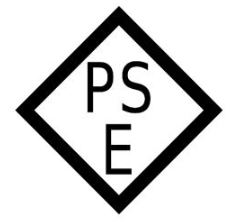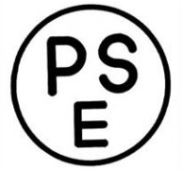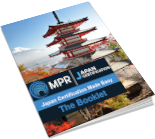your one-stop certification solution!
PSE Certification for Electronic Products in Japan
The PSE (Product Safety Electrical Appliance & Material Certification) certification is a mandatory product approval for electrical products in Japan. Her focus is on checking the electrical safety, electromagnetic compatibility and energy efficiency of specified (consumer) products. In contrast to PSC certification, which is also mandatory, PSE certification only deals with electronic devices. In contrast to TELEC certification, the electromagnetic compatibility test is limited to unintentional radiation emissions.
Since 1961, PSE certification has ensured that domestic and foreign electrical products meet Japan’s technical safety standards and do not pose a danger to users or their environment. Since then, the corresponding law has been regularly revised and expanded to take into account technical progress as well as new product categories. As a result, the list of products covered by the PSE certification obligation is continuously adjusted. The Japanese Ministry of Economy, Trade and Industry (METI) is responsible for implementation and monitoring.
Electrical products that are subject to PSE approval may not be imported into or sold in Japan without the required certification. Violations of these regulations can lead to sales bans, product recalls and severe penalties. For manufacturers and exporters, an early review of the PSE certification obligation is therefore essential to ensure market access and legal certainty.
In certain cases, products may require further certifications in Japan in addition to PSE approval, e.g. TELEC approval.
Which products require PSE certification?
The PSE certification covers various products from 20 main categories defined by the authority:
- Electrical cables insulated with elastomer
- Electrical wiring insulated with synthetic resin
- Cable ducts and other cable protection housings made of metal
- Accessories for metal cable ducts
- Fuses
- Temperature fuses
- Other electrical fuses
- Wiring Devices
- Strombegrenzer
- Transformers & Ballasts
- Single-phase low-power transformers
- Small AC Motors
- Electric heaters
- Motor-driven mechanical devices
- Luminaires and optical devices and machines
- Predefined electronic devices (general)
- AC-powered electrical appliances (general)
- Portable Power Generators
- Rechargeable lithium-ion batteries
You can find a detailed list on our page with the overview of all PSE certification-relevant products.
PSE Certification Process
PSE certification includes different requirements, the exact scope of which is defined by the respective product category. The procedure differs in terms of the scope of the necessary tests and inspections, whereby two categories are distinguished: Category A (specific products, also known as “diamond-shaped PSE” or “Diamond PSE”, after the appearance of the marking logo) and Category B (non-specific products or “round PSE” or “round PSE”).
Category A: Diamond PSE (specified products)
Products in this category are subject to the strictest requirements and a comprehensive certification process. This includes:
- Product tests that must be carried out in an accredited laboratory.
- A mandatory factory audit of the production site to ensure that manufacturing processes comply with Japanese safety standards.
- Regular follow-up audits to ensure ongoing compliance with the standards.
Category B: Round PSE (non-specified products)
For products in this category, the certification process is less complex:
- Product testing is required as part of the application.
- A factory audit, on the other hand, is not necessary.
- Once the certificate has been issued, there is no need for a regular follow-up process.
Application preparation
Submission & application review
Product tests
Factory audit (only for Category A)
Issuing of the certificates and marking
The tests required for certification must be carried out either according to current Japanese Industry Standards (JIS) or the corresponding IEC equivalent, including Japanese country deviations (if any).
PSE Certification Overview
| Diamond PSE (Category A) | Round PSE (Category B) |
|
| Certification period | 5-6 months (from application) | 2-4 months (from application) |
| Marking | Yes, with the diamond-shaped PSE logo | Yes, with the round PSE logo |
| Tests required? | Yes, in the accredited laboratories | Yes |
| Factory audit required? | Yes | No |
| Follow-up process | Regular follow-up audits and product testing required | Market surveillance in Japan |
PSE-Marking
Products that have been successfully PSE certified must be marked with the corresponding PSE logo. For Category A products, the diamond-shaped PSE logo is mandatory, while Category B products are given the round PSE logo.
The size of the logo may be variably adapted to the product in question, but good legibility must always be guaranteed. This also applies to the choice of the type of marking. The same requirements apply to the color design of the logo.


PSE Certification FAQ
The process differs greatly depending on whether a product falls into category A or B. Depending on the need for separate product tests, the procedure takes about 2-4 (category B) or 5-6 months (category A). Delays can occur in particular if external documents are missing or product tests are not passed.
All Category A and B electrical products to be sold in Japan require the appropriate PSE marking. The overview listed above can provide manufacturers with an initial overview. In principle, almost exclusively AC-powered electrical and electronic equipment and corresponding components are covered by PSE certification.
No, the information is provided in English only rarely and with a delay by METI or the test laboratories – most announcements are made exclusively in Japanese. Applicants must independently track changes in regulations or hire a consulting firm to monitor changes so that they are reliably aware of changes that affect the compliance of their products.
Subsequent changes to products that have already been certified can affect the validity of the certificate. In the case of serious modifications, such as the replacement of core electrical components, the conformity certification will automatically expire and the device must be treated as an unmarked product.
MPR Services
Your One-Stop Certification Solution.
Our complete package for product certifications for Japan.
Clarification of the certification requirements
Personal consultant for all questions about PSE
Application preparation and communication with the authorities
Preparation and support for the audit
Organization of testing
Advice on how to mark your products, if needed
Complete organization of any follow-up certifications
Contact Us!
 MPR Japan Certification – expert consulting and implementation of certification projects worldwide.
MPR Japan Certification – expert consulting and implementation of certification projects worldwide.
PSE CERTIFICATION VIDEO
Please enable cookies to enable embedded YouTube videos. For privacy-related details on data exchange through use of the videos as well as changeable cookie settings, please see the privacy policy page.
You are currently viewing a placeholder content from Default. To access the actual content, click the button below. Please note that doing so will share data with third-party providers.
More Information






